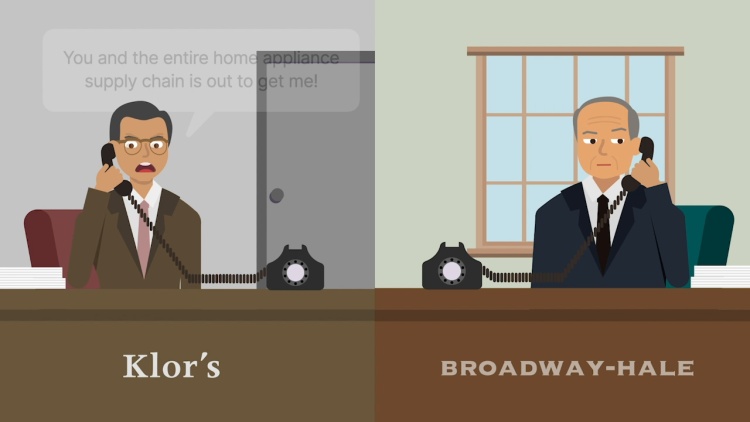Klor’s Inc. v. Broadway-Hale Stores, Inc.
United States Supreme Court
359 U.S. 207 (1959)
- Written by Nicholas Decoster, JD
Facts
In 1952, Klor’s Inc. (Klor’s) (plaintiff) began operations as a retail store for household appliances. Broadway-Hale Stores, Inc. (Broadway-Hale) (defendant), maintained a chain of department stores. Broadway-Hale opened a store next to Klor’s, and the two stores competed directly in the market for household appliances. As competition intensified, Klor’s brought a complaint against Broadway-Hale, alleging that Broadway-Hale was conspiring with manufacturers and distributors of well-known home-appliance brands to boycott Klor’s by either not selling to Klor’s or by selling to Klor’s at unreasonable prices. Klor’s further alleged that Broadway-Hale had used a monopoly position to compel the arrangement and that the boycott on Klor’s business had significantly reduced the ability of Klor’s to compete against Broadway-Hale in the market for household appliances. At trial, Broadway-Hale did not dispute the allegations and instead produced evidence that (1) hundreds of additional retailers were offering the products that Klor’s claimed were being kept out of its store, and (2) the public thus had not been harmed by any agreement between Broadway-Hale and the manufacturers and distributors. Based on Broadway-Hale’s evidence, the district court concluded that the claims did not concern public harm and were thus not unlawful under antitrust law. The district court granted Broadway-Hale’s motion for summary judgment. Klor’s appealed, but the court of appeals affirmed. Klor’s appealed the decision to dismiss the claim on summary judgment.
Rule of Law
Issue
Holding and Reasoning (Black, J.)
What to do next…
Here's why 899,000 law students have relied on our case briefs:
- Written by law professors and practitioners, not other law students. 47,000 briefs, keyed to 994 casebooks. Top-notch customer support.
- The right amount of information, includes the facts, issues, rule of law, holding and reasoning, and any concurrences and dissents.
- Access in your classes, works on your mobile and tablet. Massive library of related video lessons and high quality multiple-choice questions.
- Easy to use, uniform format for every case brief. Written in plain English, not in legalese. Our briefs summarize and simplify; they don’t just repeat the court’s language.





